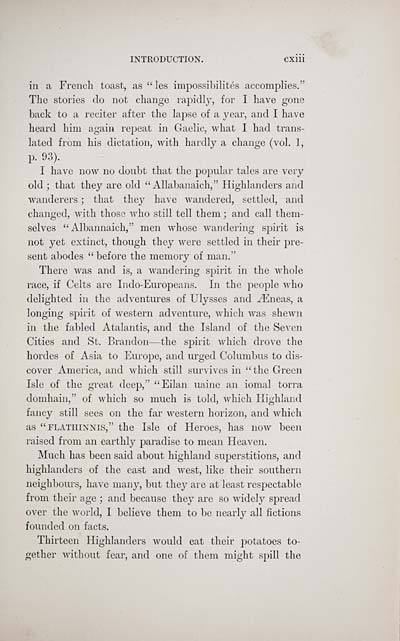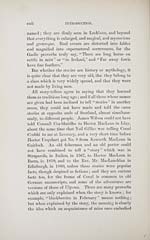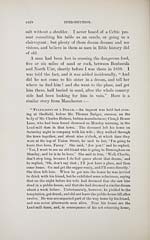Download files
Complete book:
Individual page:
Thumbnail gallery: Grid view | List view

INTRODUCTION. CXlll
in a French toast, as " les impossibilites accomplies."
The stories do not change rapidl}^, for I have gone
back to a reciter after the lapse of a year, and I have
heard him again repeat in Gaelic, what I had trans-
lated from his dictation, with hardly a change (vol. 1,
p. 9.3).
I have now no doubt that the pojiular tales are very
old ; that they are old " Allabanaich," Highlanders and
wanderers ; that they have Avandered, settled, and
changed, with those who still tell them ; and call them-
selves " Albannaich," men whose wandering spirit is
not yet extinct, though they were settled in their pre-
sent abodes " before the memory of man."
There was and is, a wandering sjiirit in the whole
race, if Celts are Indo-Europeans. In the people who
delighted in the adventures of Ulysses and vEneas, a
longing spirit of western adventure, which Avas shewn
in the fabled Atalantis, and the Island of the Se^'en
Cities and St. Brandon — the spirit which drove the
hordes of Asia to Europe, and urged Columbus to dis-
cover America, and which still survives in "the Green
Isle of the great deep," "Eilan uaine an iomal torra
domhain," of which so much is told, which Highland
fancy still sees on the far western horizon, and which
as " FLATHINNIS," the Isle of Heroes, has now been
raised from an earthly paradise to mean Heaven.
Much has been said about highland superstitions, and
highlanders of the cast and west, like their southern
neighbours, have many, but they are at least respectable
from their age ; and because they are so Avidely spread
over the world, I believe them to be nearly all fictions
founded on facts.
Thirteen Highlanders would eat their potatoes to-
gether without fear, and one of them might spill the
in a French toast, as " les impossibilites accomplies."
The stories do not change rapidl}^, for I have gone
back to a reciter after the lapse of a year, and I have
heard him again repeat in Gaelic, what I had trans-
lated from his dictation, with hardly a change (vol. 1,
p. 9.3).
I have now no doubt that the pojiular tales are very
old ; that they are old " Allabanaich," Highlanders and
wanderers ; that they have Avandered, settled, and
changed, with those who still tell them ; and call them-
selves " Albannaich," men whose wandering spirit is
not yet extinct, though they were settled in their pre-
sent abodes " before the memory of man."
There was and is, a wandering sjiirit in the whole
race, if Celts are Indo-Europeans. In the people who
delighted in the adventures of Ulysses and vEneas, a
longing spirit of western adventure, which Avas shewn
in the fabled Atalantis, and the Island of the Se^'en
Cities and St. Brandon — the spirit which drove the
hordes of Asia to Europe, and urged Columbus to dis-
cover America, and which still survives in "the Green
Isle of the great deep," "Eilan uaine an iomal torra
domhain," of which so much is told, which Highland
fancy still sees on the far western horizon, and which
as " FLATHINNIS," the Isle of Heroes, has now been
raised from an earthly paradise to mean Heaven.
Much has been said about highland superstitions, and
highlanders of the cast and west, like their southern
neighbours, have many, but they are at least respectable
from their age ; and because they are so Avidely spread
over the world, I believe them to be nearly all fictions
founded on facts.
Thirteen Highlanders would eat their potatoes to-
gether without fear, and one of them might spill the
Set display mode to: Large image | Transcription
Images and transcriptions on this page, including medium image downloads, may be used under the Creative Commons Attribution 4.0 International Licence unless otherwise stated. ![]()
| Early Gaelic Book Collections > Matheson Collection > Popular tales of the west Highlands > Volume 1 > (133) |
|---|
| Permanent URL | https://digital.nls.uk/81388824 |
|---|
| Description | Volume I. |
|---|---|
| Shelfmark | Mat.74 |
| Additional NLS resources: | |
| Attribution and copyright: |
|
| Description | Items from a collection of 170 volumes relating to Gaelic matters. Mainly philological works in the Celtic and some non-Celtic languages. Some books extensively annotated by Angus Matheson, the first Professor of Celtic at Glasgow University. |
|---|
| Description | Selected items from five 'Special and Named Printed Collections'. Includes books in Gaelic and other Celtic languages, works about the Gaels, their languages, literature, culture and history. |
|---|

